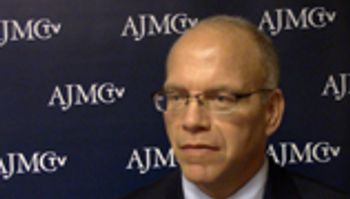
A new analysis published by the RAND Corporation suggests strategies that the pharmaceutical industry could offer payers as they try to cover the front-loaded cost of newer breakthrough drugs.

A new analysis published by the RAND Corporation suggests strategies that the pharmaceutical industry could offer payers as they try to cover the front-loaded cost of newer breakthrough drugs.

Starting with a contract that works for both parties involved is the best way to ensure payers and providers will work together, said Craig Thiele, MD, chief medical officer of CareSource.




The Patient Access Network or PAN Foundation formed more than 10 years ago, partially in response to the Medicare Part D benefit. It helps patients meet cost-sharing requirements across dozens of diseases, including 25 in oncology; Evidence-Based Oncology, a publication of The American Journal of Managed Care, invited PAN Foundation President and CEO Dan Klein to discuss its role in immuno-oncology.

The goals of the new CMS Oncology Care Model align very nicely with what payers want, according to Ira M. Klein, MD, MBA, FACP, national medical director, clinical thought leadership, office of the chief medical officer, Aetna.

A lengthy report published by the Kaiser Family Foundation predicts widespread market disruption if ACA premium subsidies are lost under King vs. Burwell. Adverse selection, insurers exiting markets, and higher rates are just some of the possibilities.


With the March 4 Supreme Court hearing on King v. Burwell looming, big business is stepping up to defend the healthcare reform law.

The panelists discuss the evidence that is weighed when determining whether or not to include a particular therapy on their regimens.

Among publications in the managed care field, The American Journal of Managed Care (AJMC) is likely the leader, according to Mitch DeKoven, principal of health economics and outcomes research at IMS Health.

A new private-sector alliance of healthcare systems and payers will dedicate to accelerate the US healthcare system's transition to value-based models aligned with improving outcomes and lowering costs.

Although some price variation is to be expected between large cities and rural areas, "extreme" price differences sometimes existed within the same market.

Analysis of State Health Innovation Plans, funded by CMS, shows a variety of emerging approaches to healthcare reform. Accenture has identified the top 5 projected investment areas.

At Patient-Centered Diabetes Care, hear stakeholders across the whole ecosystem of healthcare delivery discuss solutions for diabetes with the patient always at the center of the discussion.

The United States could save approximately $375 billion annually by simplifying the nation's complex, multi-payer way of financing care, according to a study published in BMC Health Services Research.

The quality-measurement enterprise in US healthcare is troubled. Measure developers are creating ever more measures, and payers are requiring their use in more settings and tying larger financial rewards or penalties to performance.

At its third annual conference, Patient-Centered Oncology Care 2014, The American Journal of Managed Care addressed new challenges in cancer care: more patients have coverage, but they may be "underinsured" or barred from academic centers. Amid rising drug costs and regulations that threaten community practices, the head of the largest oncology organization outlined a path toward value-based reimbursement.

Yesterday, speakers opened Patient-Centered Oncology Care, sponsored by The American Journal of Managed Care, with a discussion of how to bring palliative care into the mainstream in cancer care. While progress has been made, a cultural bias against discussion end-of-life issue remains an obstacle.

Peter Yu, MD, president of the American Society of Clinical Oncology, (ASCO) discussed the organization's efforts throughout 2014 to reform reimbursement and take on issues of value and quality in cancer care during Patient-Centered Oncology Care, the annual gathering sponsored by The American Journal of Managed Care.

Traditional pay-for-performance programs tend to result in significant waste for payers, but the industry could benefit from a slightly modified model, which focus efforts on patients who are at higher risk for poor outcomes.

The toughest topics in cancer care will be on tap November 13-14, 2014, in Baltimore, Maryland, when AJMCLive presents Patient-Centered Oncology Care. If you've followed the discussion among pharmaceutical leaders, oncologists, and payers over access to care, you'll want to join stakeholders to discuss how to ensure patients get what they need while controlling costs.

Reference pricing programs can steer patients to lower-price, adequate quality providers, but potential savings to health plans and purchasers are actually modest, according to a study from the National Institute for Health Care Reform.

Health plans, providers, and consumers have to collaborate in order to bring value, Craig Thiele, MD, chief medical officer at CareSource, said at the America's Health Insurance Plans' National Conferences on Medicare and Medicaid, and Dual Eligibles Summit.

259 Prospect Plains Rd, Bldg H
Cranbury, NJ 08512
© 2025 MJH Life Sciences®
All rights reserved.
